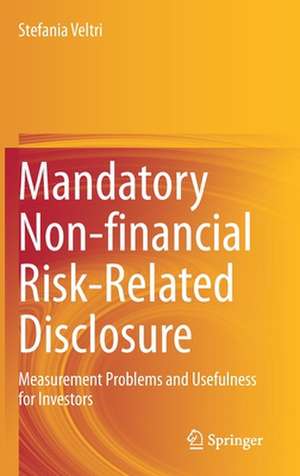Mandatory Non-financial Risk-Related Disclosure: Measurement Problems and Usefulness for Investors
Autor Stefania Veltrien Limba Engleză Hardback – aug 2020
| Toate formatele și edițiile | Preț | Express |
|---|---|---|
| Paperback (1) | 721.51 lei 6-8 săpt. | |
| Springer International Publishing – 2 aug 2021 | 721.51 lei 6-8 săpt. | |
| Hardback (1) | 727.31 lei 6-8 săpt. | |
| Springer International Publishing – aug 2020 | 727.31 lei 6-8 săpt. |
Preț: 727.31 lei
Preț vechi: 886.97 lei
-18% Nou
Puncte Express: 1091
Preț estimativ în valută:
139.21€ • 151.27$ • 117.02£
139.21€ • 151.27$ • 117.02£
Carte tipărită la comandă
Livrare economică 21 aprilie-05 mai
Preluare comenzi: 021 569.72.76
Specificații
ISBN-13: 9783030479206
ISBN-10: 303047920X
Pagini: 167
Ilustrații: XIII, 167 p. 5 illus.
Dimensiuni: 155 x 235 mm
Greutate: 0.44 kg
Ediția:1st ed. 2020
Editura: Springer International Publishing
Colecția Springer
Locul publicării:Cham, Switzerland
ISBN-10: 303047920X
Pagini: 167
Ilustrații: XIII, 167 p. 5 illus.
Dimensiuni: 155 x 235 mm
Greutate: 0.44 kg
Ediția:1st ed. 2020
Editura: Springer International Publishing
Colecția Springer
Locul publicării:Cham, Switzerland
Cuprins
Part I: Measuring Non-Financial Risk Disclosure.- 1. A Brief Overview of the Book.- 2. Risk-Related Disclosure.- 3. The Mandatory Non-financial Disclosure in the European Union.- 4. Measuring the Quality of Non-financial Risk-Related Disclosure.- Part II: Testing the Usefulness of Non-Financial Risk Disclosure.- 5. The Relationship Between Financial and Non-financial Risk.- 6. The Value Relevance Analysis.- 7. The Value Relevance of Financial Risk.- 8. The Value Relevance of Non-financial Risk.- 9. The Mediating Role of Non-financial Risk.
Notă biografică
Stefania Veltri is a senior lecturer in accounting and Assistant Professor teaching business economics. She is department member at the Department of Business Administration and Law, University of Calabria. Her main research interests are related to the value relevance of accounting and extra-accounting information and the systems of measurement, management and reporting of intellectual capital. All these arguments are pursued employing both quantitative and qualitative methods. On these research themes she has published books, book chapters, journal articles (such as Journal of Intellectual Capital, Corporate Communications, Journal of Management and Governance) and she has presented papers to national and international congresses.
Textul de pe ultima copertă
This book focuses on the impact of the disclosure of non-financial risk, which could be seen as the most relevant non-financial information (NFI), in the aftermath of the 2014/95/EU Directive. The author analyses whether the switch from voluntary to mandatory NFI enhance the quality of disclosed NF risk-related information and the usefulness of the risk disclosure for investors. The book focuses specifically on the mandatory disclosure of non-financial (NF) risks as required by the EU Directive for listed Italian companies, investigating both the state of art of its disclosure and its usefulness for investors.In doing so, the book contributes to fill two relevant gaps in risk literature. The first research gap is related to the insufficient investigation of the disclosure of NF risks. Companies mandated to disclose risk-related information focused mainly on financial risks, in spite of the width of the definition of risk, conceived as information about any opportunity, danger, threat, or exposure that has or could impact the company in the future. The second gap is that empirical evidence about the effects of corporate risk disclosures is still limited, and the potential benefits of the disclosure of information on risks have not been fully explored. In particular, the relationship between risk disclosures and firm value is under researched, as the risk literature mainly focuses on the incentives question, related to the motives for which companies decide to disclose.The research in this book focuses on Italy, a country that provides a unique opportunity to examine the impact of mandatory NF risk disclosure on firm market value, being one of the biggest industrial European countries that had not mandatory legislation for NFI disclosure, and also one of the leading countries in voluntary corporate social responsibility (CSR) reporting at an international level. It has been carried out in the fiscal year 2017, the first year of the application of the mandatory NF disclosure for obliged Italian listed PIEs.
The book contributes both to the measurement literature, as it presents a self-constructed quality NF risks and to the value relevance analysis literature, providing evidence of the usefulness of financial and non-financial risk-related disclosures in the Italian context.
Caracteristici
Analyses the measurement of the NF risk disclosure Employs a manual meaning-oriented content analysis and provides a quality NF risk Offers empirical evidence on the state of the art of NF risk-related information disclosure
